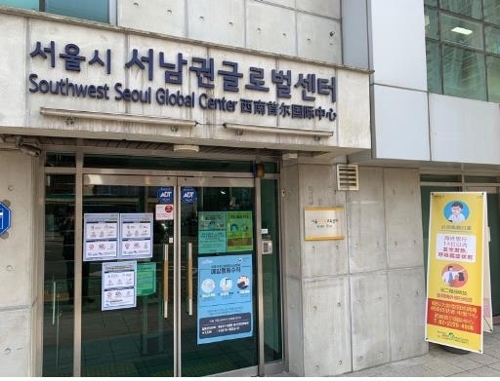Coronavirus information center opens for foreigners
By Ock Hyun-juPublished : Feb. 11, 2020 - 16:13

Seoul has launched an information and consulting center on the new coronavirus exclusively for foreigners, with translation services available in eight languages, the Seoul Metropolitan Government said Tuesday.
At the center, set up inside the Southwest Global Center in southwestern Seoul, those illegally staying in South Korea can receive help and medical treatment without worrying about being reported to immigration authorities, officials added.
The Southwest Global Center, the city-affiliated support organization for non-Korean residents, is located in Daerim-dong, Yeongdeungpo district, near Sindorim Station on subway lines Nos. 1 and 2.
The center is tasked with receiving reports, providing counseling and escorting potential patients to hospital upon request. It has distributed guidelines on preventing infection in 10 languages to some 70 organizations that serve foreign residents.
The services are available in eight languages -- English, Chinese, Vietnamese, Filipino, Pakistani, Nepalese, Mongolian and Uzbek. If people require assistance in other languages, such as Japanese, Arabic and Russian, the center will transfer them to the Seoul Global Center so they can get the help they need.
The information line can also be reached via phone (02-2229-4900), KakaoTalk messenger service (swsgc), email (hotline@swsgc.co.kr) and its website (ww.swsgc.co.kr).
Anyone infected with the virus, Korean or foreign, can receive medical treatment free of charge and can get a living allowance while under quarantine.
As of February, there are an estimated 450,000 foreigners residing in Seoul. The majority, or 67.3 percent, are Chinese (including ethnic Koreans from China), followed by Americans (6.6 percent), Vietnamese (5.2 percent), Mongolians (2 percent), Taiwanese (1.8 percent) and Japanese (1.88 percent).
(laeticia.ock@heraldcorp.com)
At the center, set up inside the Southwest Global Center in southwestern Seoul, those illegally staying in South Korea can receive help and medical treatment without worrying about being reported to immigration authorities, officials added.
The Southwest Global Center, the city-affiliated support organization for non-Korean residents, is located in Daerim-dong, Yeongdeungpo district, near Sindorim Station on subway lines Nos. 1 and 2.
The center is tasked with receiving reports, providing counseling and escorting potential patients to hospital upon request. It has distributed guidelines on preventing infection in 10 languages to some 70 organizations that serve foreign residents.
The services are available in eight languages -- English, Chinese, Vietnamese, Filipino, Pakistani, Nepalese, Mongolian and Uzbek. If people require assistance in other languages, such as Japanese, Arabic and Russian, the center will transfer them to the Seoul Global Center so they can get the help they need.
The information line can also be reached via phone (02-2229-4900), KakaoTalk messenger service (swsgc), email (hotline@swsgc.co.kr) and its website (ww.swsgc.co.kr).
Anyone infected with the virus, Korean or foreign, can receive medical treatment free of charge and can get a living allowance while under quarantine.
As of February, there are an estimated 450,000 foreigners residing in Seoul. The majority, or 67.3 percent, are Chinese (including ethnic Koreans from China), followed by Americans (6.6 percent), Vietnamese (5.2 percent), Mongolians (2 percent), Taiwanese (1.8 percent) and Japanese (1.88 percent).
(laeticia.ock@heraldcorp.com)
-
Articles by Ock Hyun-ju







![[KH Explains] How should Korea adjust its trade defenses against Chinese EVs?](http://res.heraldm.com/phpwas/restmb_idxmake.php?idx=644&simg=/content/image/2024/04/15/20240415050562_0.jpg&u=20240415144419)











![[Today’s K-pop] Stray Kids to return soon: report](http://res.heraldm.com/phpwas/restmb_idxmake.php?idx=642&simg=/content/image/2024/04/16/20240416050713_0.jpg&u=)